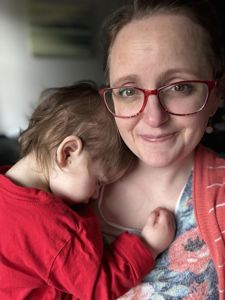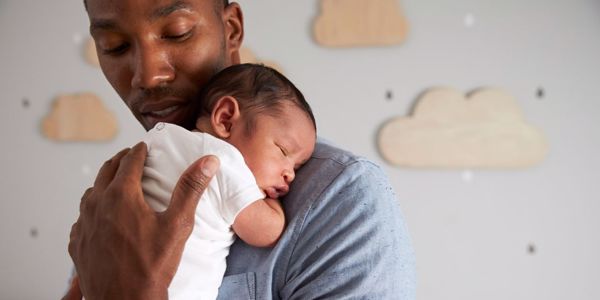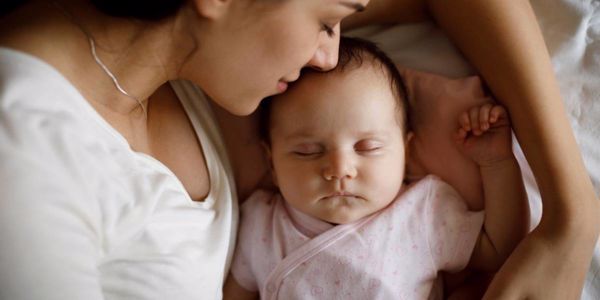A new baby brings a wave of emotions to parents. Many of those emotions are positive including love, joy, and excitement. However, many parents experience a surge of negative emotions that may leave them feeling confused, discouraged, and unsure of what to do. If this is the case for you or a loved one, know that you are far from alone.
Baby Blues
After giving birth, your body undergoes a serious physical and hormonal shift. Following nine months of growing another human being, it is a mental and emotional transition to go from carrying your child in your womb to carrying your child in your arms.
This experience is often referred to as “Baby Blues” and is a temporary condition that will resolve after a few days or up to two weeks after giving birth.
You may experience any or all of the following symptoms as you experience this change:
- Mood swings
- Anxiety
- Sadness
- Irritability
- Feeling overwhelmed
- Crying
- Struggling to concentrate
- Increased or decreased appetite
- Difficulty sleeping
Postpartum Depression & Anxiety
Beyond the expected Baby Blues, postpartum depression and anxiety have similar symptoms but they are more intense and last for an extended period.
Symptoms of postpartum depression & anxiety may include:
- Feeling depressed
- Extreme mood swings
- Significant crying
- Difficulty bonding with your baby
- Withdrawing from loved ones
- Increased or decreased appetite
- Insomnia or excessive sleep
- Feeling tired or fatigued
- No longer finding joy in things or activities you love
- Irritability or anger inconsistent with circumstances
- A deep feeling of hopelessness
- Feeling guilty, ashamed, or inadequate
- Being worried you are a bad parent
- Feeling foggy and unable to think clearly
- Difficulty making decisions
- Restlessness or panic attacks
- Thoughts of self-harm or harming your baby
- Recurring thoughts of death or suicide
When to Expect Postpartum Depression & Anxiety
Many people may feel that after a few months without experiencing postpartum depression and anxiety they are in the clear and no longer need to maintain the same level of vigilance regarding their mental health.
Usually, symptoms will be apparent within the first two weeks after birth. However, it may be surprising to learn that postpartum depression and anxiety can occur anytime within your baby’s first year of life, or even during pregnancy, before giving birth.
Symptoms may persist for months (or years), especially if left untreated. It is also possible for symptoms to come and go, or to be triggered by external factors such as stress, lack of sleep, or low levels of support.
Some women have found their depression or anxiety increasing or beginning during the hormonal and emotional transition of weaning.
Spousal Postpartum Depression & Anxiety
While postpartum depression and anxiety are most commonly associated with women, they can also occur in men (paternal postpartum depression) and non-birthing partners. Some people may be at increased risk.
Risk factors for spousal postpartum depression and anxiety:
- History of depression or anxiety
- Relationship difficulties
- Financial struggles
Postpartum Psychosis
A rare but serious condition to be aware of is postpartum psychosis. Similar to postpartum depression or anxiety, only much more severe, postpartum psychosis will develop within a week after birth.
Symptoms of postpartum psychosis to look for:
- Feeling confused or lost
- Having obsessive thoughts about your baby
- Hallucinating or having delusions
- Sleeping too little or too much
- A surge of energy and feeling upset
- Paranoia
- Attempts to self-harm or harm your baby
Because of the life-threatening nature of postpartum psychosis, it is pertinent to seek medical help swiftly and thoroughly.
How to Treat Postpartum Depression and Anxiety
Baby blues and postpartum depression or anxiety are common conditions that warrant the appropriate respect and attention to avoid serious or long-term complications.
If you notice yourself or a new parent experiencing any of the symptoms above, especially if those symptoms are interfering with their day-to-day life, making it difficult for them to care for themselves or their baby, or possibly posing any kind of danger to themselves or their baby, it is important to seek medical care.
Self-care, the support of family and friends, and the advice of medical and mental health professionals should all be utilized during the postpartum healing period.







